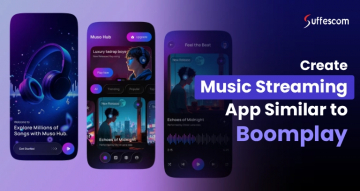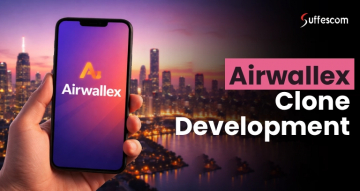School Bus Fleet Management Software Development

Nowadays, managing school transportation is challenging. Parents expect reliability, students seek security, and schools aim to operate efficiently. Achieving these goals requires careful planning, effective communication, and coordination, which can be challenging using traditional methods. This is where robust school bus fleet management software steps in as a revolutionary tool to streamline operations and improve business efficiency.
The fleet management software market size is expected to grow from USD 27.55 billion in 2024 to USD 116.56 billion by 2032. Therefore, whether you are a school administrator or fleet manager, adopting an efficient school bus fleet management system enhances operational efficiency and profitability.
Let's start reading it now!
Automate Fleet Operations with School Bus Fleet Management Software
Contact our team of expert developers and designers to develop robust school bus fleet management software to simplify administrative tasks and boost efficiency.
What is a School Bus Fleet Management Software?
School bus fleet management software is a digital platform that helps organizations or transportation authorities manage and optimize the use of their school buses. It provides a centralized interface with comprehensive tools to track buses, monitor driver behaviors, manage fuel consumption, and schedule maintenance, enhancing operational efficiency and fleet performance.
How School Bus Fleet Management Process Works?
Here is the step-by-step process of school bus fleet management.
1. GPS Tracking
First, each driver has a mobile device with real-time GPS receivers to track the bus's location, speed, and direction. They can also efficiently manage their routes, stops, and schedules from their mobile devices.
2. Cellular Networks
The mobile device continuously shares real-time location and operational data via cellular networks to ensure constant and efficient fleet monitoring.
3. Secure Servers
The fleet-related information, including route details, driver activity, and stop logs, is sent to secure servers for reliable data management.
4. School Bus Fleet Management Software
Fleet admins can access all the necessary information through efficient school bus fleet management software, which makes tracking, scheduling, and reporting easy.
Varied Ranges of School Bus Fleet Management Software
Following is the list of varied ranges of school bus fleet management software.
1. Driver Management Software
It is specialized software that helps fleet owners effectively manage, monitor, and train their drivers. It enhances drivers' productivity by providing advanced features like real-time performance monitoring and safety alerts.
2. Fuel Management Software
This software helps track fuel consumption, manage refueling processes, and control fuel usage to reduce fuel costs and improve overall fleet sustainability.
3. Fleet Analytics Software
This software provides detailed insights about fleet performance by analyzing metrics like vehicle usage, maintenance cost, driver behavior, etc, helping fleet owners make informed decisions.
4. Fleet Safety Software
The comprehensive safety software empowers fleet owners with features like real-time tracking, compliance monitoring, and safety training to reduce accidents and enhance safety protocols.
5. Route Planning and Optimization Software
The route planning and optimization software includes real-time traffic updates, considers vehicle capacity, and offers dynamic route adjustments to enhance operational efficiency.
ev School Bus Fleet Management Software Solutions
Suffescom built a robust ev school bus fleet management system that aims to reduce the idle time of school buses, record maintenance track & route optimization.
Essential Features of School Bus Fleet Management Software
Fleet management software provides various features depending on the specific business requirements. Let's explore the most crucial functionalities for developing a fleet management app.
For Fleet Managers/Owners
1. Vehicle Tracking and Monitoring
The app includes real-time GPS, which helps the fleet manager monitor bus speed, route adherence, and idle time to make informed decisions.
2. Maintenance Scheduling
It sends automatic reminders for tracking service history, regular maintenance, bus condition, and repair schedules.
3. Driver Behavior Monitoring
It alerts the owner about the driver’s unsafe driving behaviors, such as overspeeding, harsh braking, or excessive idling.
4. Fleet Performance Analytics
The app provides detailed reports on fuel usage, vehicle health, driver performance, and overall fleet efficiency to help you make improved decisions.
5. Compliance and Safety Monitoring
The efficient school bus fleet management system ensures that every bus meets regulatory requirements and safety standards, such as inspection and permits.
6. Cost Tracking
The app uses fuel analytics tools such as TensorFlow to track fuel costs and Big Analytics to track repairs and salary expenses, which improves budgeting and cost analysis.
For Bus Operators
1. Real-Time GPS Tracking
This allows the operator to track bus locations, ensuring buses are on schedule, and drivers adhere to planned routes.
2. Driver Assignment
It helps assign drivers to specific routes, manage shift changes, and oversee the day-to-day allocation of buses to drivers.
3. Maintenance Alerts
The app sends notifications about vehicle issues, maintenance schedules, and the need for repairs or inspections.
4. Operational Reporting
It has various reporting tools to assess bus utilization, driver performance, and service coverage.
5. Fleet Utilization Reports
The app gives Insights into how effectively buses are being used, identifying underutilized vehicles or overworking certain buses.
6. Communication with Drivers
Efficient communication is crucial for smooth operations. The app includes tools for sending messages or alerts to drivers about route changes, delays, or emergencies.
7. Fuel Management
The bus operator can monitor fuel usage across the fleet and identify areas for optimization to reduce fuel costs.
For Drivers
1. Route Optimization
The app uses technological advancements like mapping APIs and geospatial databases for efficient route optimization.
2. Route Guidance and Navigation
The app allows drivers to use GPS navigation with real-time traffic updates, which helps them follow the right path without any delay or accidents.
3. Driver Safety Alerts
The app includes a safety alert feature that immediately updates the driver on speed limits, unsafe driving, or other safety concerns.
4. Daily Vehicle Checklists
The app enables drivers to do checklists, ensuring the bus is safe before starting the route (e.g., checking for damage, tire pressure, and fuel levels).
5. ELD Compliance (Electronic Logging Device)
ELD, an electronic logging device, is an FMCSA-registered compliance device that records drivers' driving hours. Integrating Bluetooth-enabled IoT device management software with Firebase collects real-time data and provides reports.
6. Communication with Fleet Manager
The app provides various communication tools, such as texts or calls, through which drivers can communicate directly with the fleet manager or owner.
7. Incident Reporting
The school bus fleet management system provides drivers with easy-to-use communication channels to report any unfavorable incidents where they need immediate assistance.
For Admin Panel
1. User Management
The admin can manage users (drivers, fleet managers, bus operators) and their permissions/access to the system.
2. Scheduling and Timetable Management
The app allows the owner to set up and update bus schedules, assign routes, and handle changes based on school holidays or emergencies.
3. Data Analysis and Reporting
The admin can access in-depth reports on fleet performance, driver behavior, fuel consumption, and route efficiency.
4. Compliance Monitoring
The admin can ensure that all operations comply with local, state, or national regulations for school transportation.
5. Incident Management
The app allows the admin to track and respond to accidents to manage insurance claims.
6. Driver Payroll Management
The app can easily integrate with payroll systems to calculate driver wages, considering hours worked, routes, and performance.
7. Emergency Alert System
The driver can set up alerts for emergencies, like accidents, breakdowns, or safety issues, and communicate with parents, schools, and other stakeholders.
Suffescom-Leading college bus fleet app development company
At Suffescom, we prioritize customer satisfaction, which motivates us to build a robust and efficient college bus fleet app for their business's sustainable growth.
Advanced implementations of School Bus Fleet Management Software
Below are the cutting-edge technologies we integrate with school fleet management software for comprehensive and efficient fleet management.
1. AI Dash Cameras
Integrate an AI dash camera with proactive in-bus teaching to detect real-time incidents and safeguard drivers and students. These AI-powered dash cameras allow you to track your driver's behavior and identify bad habits that can cause accidents. Moreover, it helps keep solid proof to prevent any expensive legal procedures.
2. Blockchain
When managing a school fleet management business, it is essential to maintain various types of records, including transaction records, vehicle registrations, safety records, and performance metrics. Blockchain is the ultimate method for preserving all documents in the most secure, thorough, and transparent way possible. Therefore, we utilize leading decentralized blockchain networks such as EOS, Polygon, and Ethereum to help you create encrypted, hack-proof, and high-performing smart contracts.
3. Telematics
Integrate Telematics systems with GPS tracking and onboard sensors to collect comprehensive data on vehicle operations. Monitor factors such as driver performance, idle time, and route optimization to enhance fuel efficiency and avoid unnecessary fuel consumption for minimal operational costs.
4. Augmented Reality
Augmented reality is another advanced technology that enhances the functionality of the school fleet management system. Employ AR technology in every component of the fleet, from picking up students to securely driving the vehicle on the road. This integration helps easily and quickly analyze any issue in a specific vehicle part. The expert can use wearable AR glasses to diagnose problems by gazing at the bus components. Routine check-ups keep the vehicles well-maintained and contribute to overall cost savings.
5. IOT( Internet of Things)
Integrate IOT sensors with the school bus charter app to monitor environmental conditions like temperature, pressure, motion sensors, and humidity. This integration detects maintenance issues and enhances students' experience during long trips.
Tech Stack Used To Develop A Robust College Bus Fleet App
Choosing the right tech stack for an app development directly impacts its functioning and smooth long-term performance. Here is the strong tech stack we used to develop a robust college bus fleet app.
| Type | Technology |
| Framework/Library: | React Native or Flutter (Cross-platform) React.js (Web app) |
| UI/UX Design: | Figma or Adobe XD, Material UI or Tailwind CSS |
| Programming Language: | Node.js (with Express.js) Python (Django or Flask) Ruby on Rails |
| Database | PostgreSQL or MySQL, MongoDB |
| Authentication: | OAuth, JWT |
Robust and Reliable School Bus Fleet Management Software
Suffescom builds efficient, secure, and robust school bus fleet management software that simplifies fleet operations, ensures student security, and maximizes profits.
Benefits of School Bus Fleet Management Software
The school bus fleet management software offers numerous benefits, some listed below.
1. Cost Efficiency:
An efficient school bus fleet management software's innovative route planning feature ensures drivers follow the correct path and are accountable for their actions, significantly reducing fuel consumption. Additionally, it sends timely maintenance alerts to ensure every bus is maintained correctly, reducing overall maintenance costs.
2. Enhanced Security:
One primary concern of any school transportation system is the security and safety of the students. Implementing school bus management software enhances these measures. It tracks the school buses in real time and provides their exact location at any given time. Moreover, the software has features such as RFID card-based attendance to better control who boards and exits the buses. The system enables quick communication between you, drivers, and students during emergencies to avoid unfavorable outcomes.
3. Improved Communication and Parent Engagement:
Efficient communication between the driver, you, and the parents is crucial for smooth, transparent operations. A school bus rental App provides real-time communication that alerts parents about the bus's arrival and departure time through notifications. Moreover, it provides a dedicated parent portal where parents can track their child's bus location in real-time and ensure their safety. This creates a more convenient and hassle-free experience for parents and increases their engagement.
4. Better Operational Efficiency:
A school bus fleet management system provides detailed insights and analytics of operations such as vehicle availability, maintenance, driver behavior, security, etc. The software analyzes these data to recommend the best routes with less congestion and better resource allocation for better fleet performance and efficiency.
Cost Estimation of Developing a College Bus Fleet App
The average development cost of a college bus fleet app starts from $10,000. However, depending on the app's complexity, features, design, integrations, etc., it may increase or decrease. Check out the estimated cost of app development according to the pointers below.
1. UX/UI Designing:
The Design of a school bus fleet management software plays a crucial role in making it visually appealing and grabbing users' attention. However, choosing simple colors and designs costs less than using consistent color themes and intuitive designs.
2. App Features:
The complexity of the features and added features impact the development cost of the school bus fleet management software. Apps with basic features cost less than school bus charter apps with more advanced features.
3. Storage/ Database:
Efficient data handling is crucial for smoother operations but requires sufficient storage. Whether you choose server installation or cloud storage subscriptions, both require significant investments.
4. ThirdParty Integrations:
Third-party integrations enhance your software's functionalities and make it unique. However, integrating different APIs into your software may impact its development cost.
5. App Platform:
The next is the launching platform that determines the development cost of the college bus fleet app. You can deploy your software on iOS and Android separately or adopt cross-platform fleet management app development, which is expensive but time-saving.
6. App Security and Maintenance
Last, the security and maintenance phase also determines the software's development cost. Developing secure school bus fleet management requires robust security measures to prevent data breaches and cybercrimes, which increases the cost.
Enhance Student Experience with our School Bus Fleet Management Software
Consult our experience team to discuss your project requirements and build an efficient school bus fleet management system.
Monetization Reasons to Build a School Bus Fleet Management Software
Below are the best monetization strategies for your sustainable growth and improved ROI. Check them now!
Subscription-Based Model (SaaS):
One of the most common yet sustainable ways to monetize school bus fleet management software( SaaS) with a subscription model for recurring income.
In-App Advertising:
Display relevant ads for educational resources or vehicle-related services within the app and earn money.
Freemium Model for Parents/Students:
Provide basic features like tracking bus location free while charging for premium features, such as push notifications, alerts, detailed route tracking, etc.
Partnership with Educational Institutes
Partner with educational organizations, schools, and colleges to provide customized solutions and generate revenue through long-term contracts.
Choose Suffescom to Build a School Bus Fleet Management System
Suffescom is the leading full cycle software development company with 13+ years in the IT industry. We have a team of dedicated developers and designers who work vigorously to develop robust, scalable, and efficient college bus fleet management apps. At Suffescom, we use the latest technologies to build customized solutions to satisfy our clients.
Frequently Asked Questions
How much does it cost to build a school bus fleet management software?
The average development cost of scalable school bus fleet management software is between ….. However, it may vary depending on added features, the launching platform, integrations, the database, the testing procedure, etc.
What approach or steps do you follow to develop a robust school bus fleet management software?
At Suffescom, we take a meticulous approach to building school bus fleet management applications. Here are the steps we follow.
Market research:
At Suffescom, we conduct thorough research to analyze and understand market trends, competitors, and user requirements, which helps us create strong wireframes.
UI/UX design:
We develop virtually attractive software with precise icon placement for smoother navigation.
Development Phase:
Here, our developers use their expertise to write code and integrate the necessary or additional features.
Testing and Verification:
Our Q&A team tests each software component at this stage and ensures it performs accurately.
Launching:
Finally, we launch the platform in the required platforms and check it for regular maintenance.
How do you implement college bus fleet management software?
MVP development and inclusion are the two primary ways to implement school bus fleet management software. Each model has different development and implementation strategies.







